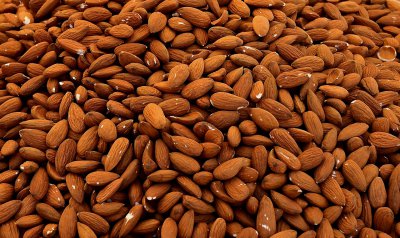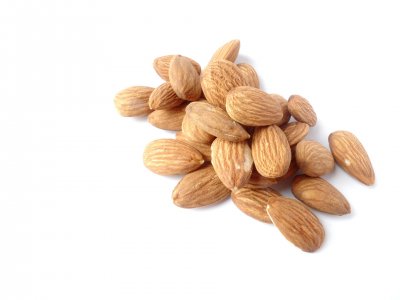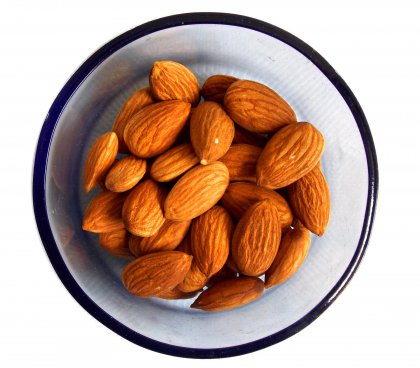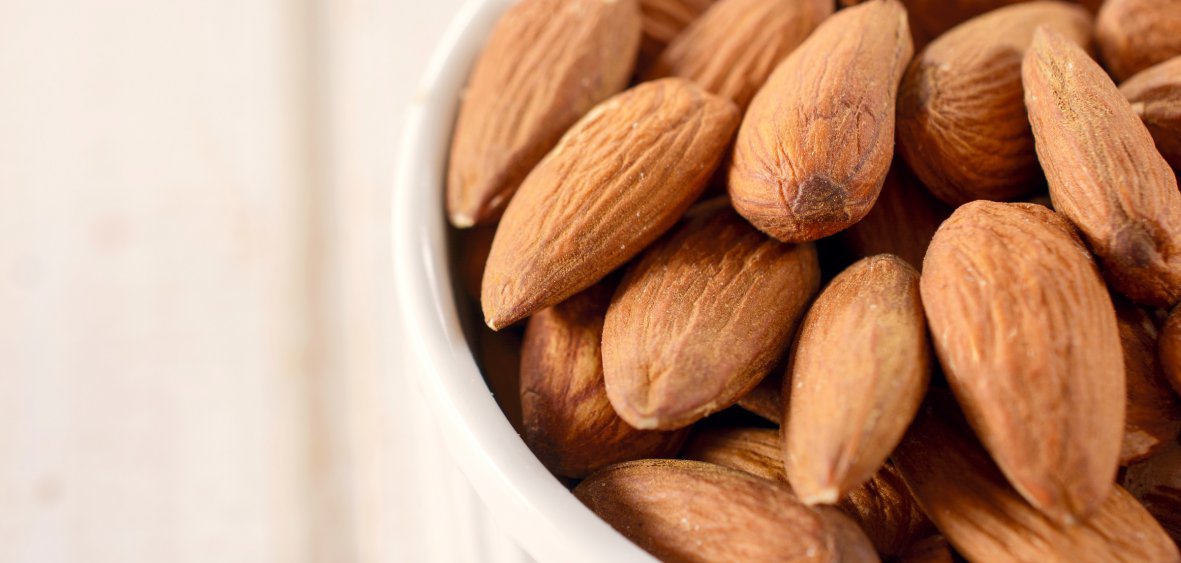 Almonds are considered to be the noblest type of nut. They contain a very large amount of vitamin B2 (riboflavin), vitamin E and fibre. They are also rich in essential unsaturated fatty acids and minerals. Their composition has a salutary effect on the heart and nervous system of man. In addition, they allow you to effectively fight diabetes and atherosclerosis.
Almonds are considered to be the noblest type of nut. They contain a very large amount of vitamin B2 (riboflavin), vitamin E and fibre. They are also rich in essential unsaturated fatty acids and minerals. Their composition has a salutary effect on the heart and nervous system of man. In addition, they allow you to effectively fight diabetes and atherosclerosis.
What do almonds contain?
Consume 100 g of almonds and assimilate:
Vitamins:
- Thiamine - 0,205/0,191 mg
- Riboflavin - 1,138/0,711 mg
- Niacin - 3,618/3,500 mg
- Vitamin B6 - 0,137/0,115 mg
- Folic acid - 44/49 µg
- Vitamin E - 25,63/23,75 mg
- Vitamin A - 2/7 IU
Minerals:
- Calcium - 269/236 mg
- Iron - 3,71/3,28 mg
- Magnesium - 270/268 mg
- Phosphorus - 481/481 mg
- Potassium - 733/659 mg
- Sodium - 1/19 mg
- Zinc - 3,12/2,97 mg
The energy value of this portion is 579 calories. In 10 dkg of almonds almost half is fat (19.93 g). The other ingredients are:
Total protein - 21.15g
Carbohydrates - 21,55 g
Fibre - 12 g
The impact of almonds on our health
 Almonds have a high fat content, which in the past was considered unfavourable when consumed in large quantities. Currently, it is already known that almonds can significantly reduce the level of the so-called "bad" cholesterol, i.e. LDL cholesterol fraction, while increasing the content of HDL cholesterol. Eating almonds effectively reduces the risk of atherosclerosis and stroke. It also prevents heart attacks.
Almonds have a high fat content, which in the past was considered unfavourable when consumed in large quantities. Currently, it is already known that almonds can significantly reduce the level of the so-called "bad" cholesterol, i.e. LDL cholesterol fraction, while increasing the content of HDL cholesterol. Eating almonds effectively reduces the risk of atherosclerosis and stroke. It also prevents heart attacks.
Almond consumption also provides protection against diabetes. Due to their fibre content and essential unsaturated fatty acids, almonds have a beneficial effect on blood sugar levels, as they weaken the absorption of glucose in the intestines.
By eating almonds, we introduce substances that fight free radicals into the body. Almonds are a rich source of antiradicals. In other words, almonds reduce the risk of cancer (caused by free radicals). Free radicals also cause accelerated skin aging by damaging collagen and elastin fibres.
Almonds also contain compounds with anti-inflammatory properties. Short-term inflammatory conditions do not cause significant losses in the body, while chronic inflammation can seriously contribute to the development of cardiovascular diseases, type 2 diabetes.
A handful of almonds a day means good protection against many diseases and a young appearance.
Peel almonds
 Not everyone knows that almonds should be peeled from the skin. The skin is not tasty and also contains phytic acid. This acid is responsible for reduced absorption of minerals, including magnesium, calcium, iron and zinc.
Not everyone knows that almonds should be peeled from the skin. The skin is not tasty and also contains phytic acid. This acid is responsible for reduced absorption of minerals, including magnesium, calcium, iron and zinc.
Another reason, much more serious, is the high probability that toxic chemicals used for their pasteurisation will be ingested together with the skin. It is worth knowing that all almonds that enter our market from the United States are pasteurized, and there is a great majority of them.
The reason for this is the obligation introduced in the USA to pasteurize almonds by the action of hot steam or freezing. The cheapest way, however, is to use chemicals (polyphenylene oxide) for this purpose.
How to peel almonds to preserve their properties?
Almonds should not be poured with boiling water before peeling. Hot water transforms essential unsaturated fatty acids into harmful trans-fats. They cause acidification of the body, may cause cancer, inflammation and diabetes.
Temperature above 60oC causes the loss of vitamins, and also has a destructive effect on enzymes. Almonds in their natural state contain vitamin E, magnesium and proteins, which are not resistant to high temperatures. Essential unsaturated fatty acids unless treated at high temperature. The human body is not able to produce these acids on its own, and their absence can lead to serious diseases. It is therefore worth accepting them at every possible opportunity.
Peeling almonds makes it much easier to soak them in water for at least 24 hours. After half of this time, it is worth replacing the water with fresh water. Remember that although cold peeling almonds is not as easy as scalded almonds, the possibility of consuming the full richness of these nuts will reward all the effort associated with getting rid of the skin.
Which almonds are safe?
 If we do not want to expose ourselves to the risk of toxic substances entering the body, we must be careful to purchase almonds of Spanish or Italian origin. There is no requirement for pasteurisation in these countries, so we are sure that we consume almonds in their natural form.
If we do not want to expose ourselves to the risk of toxic substances entering the body, we must be careful to purchase almonds of Spanish or Italian origin. There is no requirement for pasteurisation in these countries, so we are sure that we consume almonds in their natural form.
In addition to sweet almonds, bitter almonds are also available commercially. They contain amigdaline. It is a substance that releases cyanide in the body, also known as Prussian acid. This is a toxin that can even be fatal in large doses. Scientists claim that small amounts of such almonds do not pose a threat to humans. However, if you have a choice of sweet and bitter almonds, there is no point in taking the latter into account.















